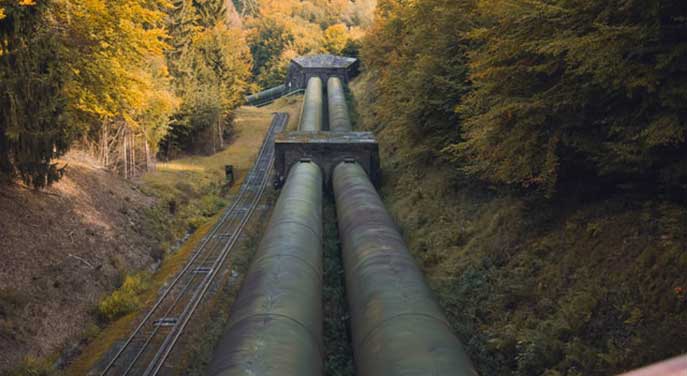 In mocking response to those wishing to separate, some quip that Alberta would remain landlocked the day after it becomes independent. With a more respectful tone, Alberta’s premier used similar words in his recent “fair deal for Alberta” speech.
In mocking response to those wishing to separate, some quip that Alberta would remain landlocked the day after it becomes independent. With a more respectful tone, Alberta’s premier used similar words in his recent “fair deal for Alberta” speech.
Those endorsing and those opposing Alberta’s separation from Canada would benefit from a clear statement of the problem to which separation is presented as a solution.
Alberta and Saskatchewan are the only landlocked provinces in the country. Being landlocked means that a territory doesn’t have direct access to ocean waters.
But it’s not an unsolvable problem. One can obtain territorial corridors to access oceans. Or one can secure passage through neighbouring territory for exportable goods by building highways and railways, airways and waterways, transmission lines and pipelines.
Alberta’s and Saskatchewan’s geographic problem needs to be distinguished from the political problem of having lawfully exportable goods blocked by other provinces from reaching tidal waters.
Obstructing Alberta’s and Saskatchewan’s oil from reaching far-away markets builds walls against solutions to the geographic problem. Those walls are existential threats.
So the issue isn’t that Alberta and Saskatchewan are landlocked. Many territories in the world are landlocked but are prosperous because they don’t have obstructing neighbours.
For all the inequity and unfairness in policy that Alberta and Saskatchewan have been subjected to since they were carved out of the Northwest Territories and became provinces in 1905, being landlocked hasn’t been the principal problem.
The eco-green doom fuelling the blockage is an excuse. The alarmist doom is the means by which Laurentians seek to strangle Alberta’s economy.
While a federal tanker ban shuts out Prairie oil from British Columbia’s north coast, oil tankers filled with foreign oil enter the Bay of Fundy in the Atlantic and up the St. Lawrence River. There, with flow and tide, even a small spill could spoil thousands of kilometres of unique ecosystems along sensitive shores, parks and natural reserves.
Similarly, there’s no campaign (nor should there be) to stop the oil flowing out of Newfoundland and Labrador, and Nova Scotia. No prime minister has ever visited those provinces to announce his/her desire that they keep their oil well beneath the ocean.
Blocking Prairie oil is not about the environment. And neither is it about safety. With all their risks, pipelines remain the safest mode of transport for oil, given the alternatives of trucks and trains. The people of Lac-Mégantic, Que., understand this very well.
Blocking our oil goes beyond the faction currently running the federal government. Ottawa represents the dominant population of the country who have declared war on our principle resources under the ecological banner. That’s not likely to change.
The war against Prairie oil is 100 percent political.
If you think I’m taking too much licence when I suggest that Laurentian Canadians mean to subjugate the West, let us be reminded of sentiments Justin Trudeau expressed in a radio interview in Quebec before he became prime minister, before he became better schooled in the political art of concealing what he means. He said that the country can best be run by federal Liberals from Quebec. He said Canada’s troubles at the time were because Albertans were running things. Power, therefore, needed to be wrestled away from Albertans.
Despite the words of the prime minister on election night that he wants to address regional concerns, Saskatchewan’s search for solutions was met with platitudes and climate slogans when its premier recently visited Ottawa.
One can only negotiate with those whose minds and spirits are open to negotiations.
Dismissing and reducing the blockage of Prairie oil to a geographic issue is a misapprehension of the problem. Blocking Alberta’s and Saskatchewan’s oil is a political problem that will require political solutions, and political solutions require co-operation.
For Alberta and Saskatchewan, the future is at stake. Without that openness and co-operation from Ottawa, Quebec and British Columbia, Alberta and Saskatchewan will have to find their own solutions.
Marco Navarro-Génie is president of Haultain Research Institute and a senior fellow with the Frontier Centre for Public Policy.
Marco is a Troy Media contributor. Why aren’t you?
The views, opinions and positions expressed by columnists and contributors are the author’s alone. They do not inherently or expressly reflect the views, opinions and/or positions of our publication.


